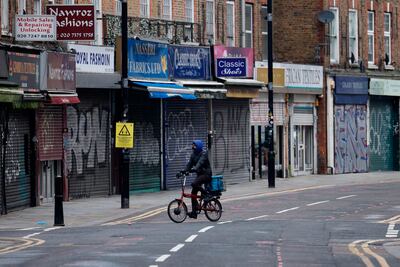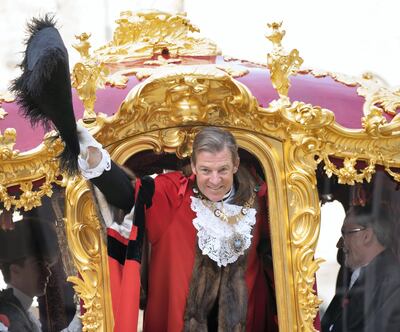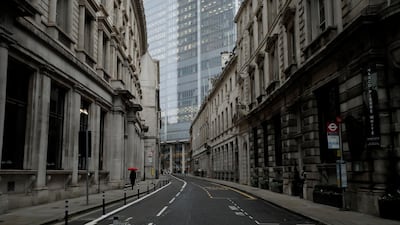Major companies in the City of London are planning a three-day week post-pandemic as the Square Mile considers how to lure office workers back to the capital.
The financial district is currently “empty” amid England’s third national lockdown, according to William Russell, the lord mayor of the City of London, who hopes the 500,000-strong workforce will stop working from home once lockdown is lifted to help revive the area.
"Most corporations I'm talking to are looking at three days a week," Mr Russell told The National shortly after delivering an online speech at Abu Dhabi Sustainability Week.
“Then I spoke to somebody the other day, who's really keen to get everyone back into the office five days a week because they feel really strongly about the collaborative nature. But you can never coerce anyone back, there is going to be adapting.”

Mr Russell, who heads the City of London Corporation that oversees operations in the Square Mile, took on the unpaid role in 2019 and decided to stay on for a second term in November to provide continuity during the pandemic, becoming only the second mayor to do so.
The former Merrill Lynch investment banker has spent most of his second term working from home just south of Cambridge, last visiting his official London home, the 18th century Mansion House, in December before England was plunged into lockdown again this month.
However, he said he has reached more people as “virtual Lord Mayor” than during a typical year in which he would spend 100 days travelling and visit up to 30 countries.
“In a way you could argue that’s worked out better for the City,” he said.
While Mr Russell is optimistic the Square Mile will recover from the pandemic and “build back better” through green finance and the FinTech sector, he conceded work hard is needed to attract employees because working from home has turned out better than expected for many.
“Working from home has almost been too successful, which has meant people haven't found the need to come back into the City,” said Mr Russell, who caught coronavirus from his wife Hilary last March and suffered mild symptoms.
While the home-working trend cannot change in the near term as England remains locked-down until mid-February at the earliest, Mr Russell plans to lead a reopening campaign to encourage workers back to the office.
An initial "back to work week" was scheduled to take place in April to boost restaurants, cafes and other venues that rely on offices occupied by workers, however, he said this may be delayed until May or even June, depending on the success of the UK's vaccination drive.
“Will [the number of employees] go back to where we were in February 2020? No, not in the near term. We had more than 500,000 people coming into the City of London every day and it's going to take some time to get back to that,” he said.
However, he insisted that "the office is not dead" and the City "will bounce back" because collaboration, creativity and idea generation works best in the office.

Having staff back at work is also key for the small-to-medium enterprises that rely on their presence – and comprise 99 per cent of the businesses in the Square Mile. To date, cafes and sandwich shops have been forced to rely on business rates relief and other government support measures to survive the cycle of lockdowns.
“We don't want boarded-up coffee shops in the City; that would be awful. So we're trying to work closely with them and help out where we can," said Mr Russell.
“There are some ideas around some voucher schemes where companies give vouchers to employees to go and spend money with the local businesses.”
Another challenge for cities now is that they are now competing with "localism", as employees prefer to stay close to home and avoid travelling to work.
“Our village shop has never had a better time of it," he said.
However, he stressed that the drive to attract workers will not only focus on staffing offices by opening up transport services into the City, but also on encouraging them to eat out locally for lunch and go out after work too, say, the theatre.
One idea being mooted is for reopening week to focus on the young “because all our surveys say the younger kids want to come back, because a lot of them are sharing rooms and they're finding it very frustrating”, said Mr Russell.
The fall-out from Brexit is another challenge facing the nation's financial centre.
About $6 billion in European share trading left the City for the continent on the first business day after the transition period because the EU trade deal, which came into effect on January 1, does not cover financial services.
Extensions are in place to avoid disruption to the market until discussions over equivalence, an arrangement governing cross-border financial services, are complete. However, Bank of England governor Andrew Bailey said earlier this month that up to 7,000 City jobs were lost to Brexit.
Mr Russell, the 692nd lord mayor, said this figure was far less than the 85,000 jobs touted by consultancies in the run-up to Britain’s final departure from the EU, and that the City can adapt to change by focusing on key growth areas such as FinTech.
“We are the FinTech centre of the world and that's not just the City of London – it's across the whole of the UK. There are 146 FinTech companies in Scotland alone,” he said.
“Yes, we've lost a bit from Brexit but we will recover and let's see what happens with our negotiations over the next few months with our friends in Brussels.”
Mr Russell is also expecting a surge in new listings on the London Stock Exchange with about 20 that he knows of already in the pipeline over the next 12 to 18 months.
Another opportunity for the City is green finance, he said, particularly as the UK is aiming for a net-zero economy by 2050.
In his speech at ADSW, he said that the world is fast approaching a time when every financial decision will take climate change into account, with the pandemic renewing the world’s focus on sustainability.
“Sustainable investments have proven to be resilient during this unstable economic period,” he told delegates.
“The core thesis of ESG (environmental, social, and corporate governance) – managing risk – has been validated, as ESG strategies outperform in a global economic downturn.”
Abu Dhabi's sustainability event comes two months after the City of London hosted the Green Horizon Summit, which saw former central bank governor Mark Carney outline his private finance strategy ahead of Cop 26, the UN climate summit set to be hosted by the UK in Glasgow later this year.
Mr Carney called on banks, insurers and fund managers to invest in private sector initiatives and profit from "the greatest commercial opportunity of our time" to help companies transition to a net-zero future.
The same month, UK Finance Minister Rishi Sunak unveiled the UK's first Sovereign Green Bond, due to go live this year, to finance climate change projects, infrastructure investment and create green jobs across the country.
Mr Sunak also unveiled more robust environmental disclosure standards to ensure investors and businesses better understand the material financial effects of their exposure to climate change.
The UK will become the first country in the world to make Task Force on Climate-related Financial Disclosures-aligned disclosures mandatory across the economy by 2025.

Mr Russell said the UK’s green agenda will also help the City navigate its way out of the pandemic as the financial district can help stakeholders around the world filter investments into green projects.
“I refer to myself as the green lord mayor and talk about it being the green brick road to Glasgow so there are huge opportunities,” he said.
“The UK economy is in a dire position but jobs will be created through these green projects through the sustainable agenda.”
Mr Russell also commended the UAE and wider Gulf region for their efforts to tackle climate change.
“It’s so positive. They are investing in solar, they’re investing in wind farms, and they’ve made some very positive statements about a 25 per cent reduction in emissions by 2030,” he said.
Mr Russell said he has spent more time in the UAE and wider Gulf region during his tenure as Lord Mayor than any other part of the world because it’s “a very important trading partner”.
“We already have a great relationship and a GCC trade deal will just enhance that even more. Hopefully, it will happen sooner rather than later," he said.
“We do more with GCC than we do with China. There’s a great history with our friends in the GCC and whenever I go there I'm so bowled over by how welcoming everyone is and how keen they are to continue to do business with the UK.”


